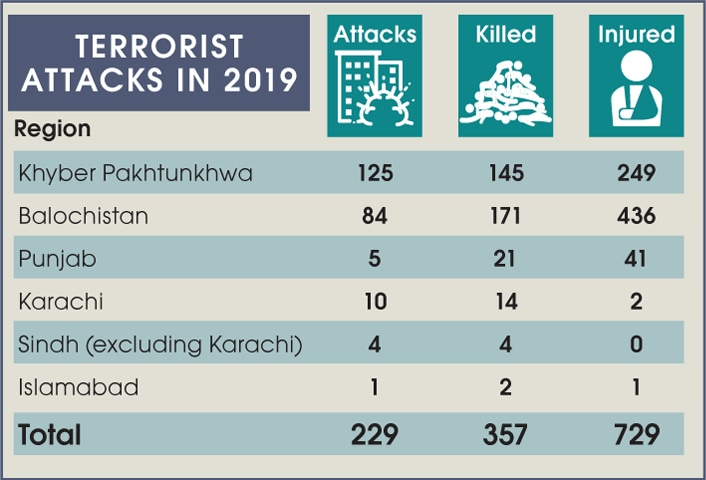


13 March 2020, Friday
Lakshmi V Menon
Pakistan Institute for Peace Studies (PIPS) has published their Special Pakistan Security Report for 2019. PIPS is an independent, non-governmental non-profit advocacy and research think-tank. Since 2006, PIPS has maintained a digital database on conflict and security issues such as inter-tribal in-fighting, sectarian clashes, insurgent attacks, details on terrorists, sectarian related terrorism, cross-border attacks, ethno-political violence, operational attacks by security forces, kidnapping, search and arrest operations of law-enforcement departments, and militant clashes.
As per the report, in Pakistan, terror attacks have dropped by 13 per cent and the number of casualties of terror incidents have decreased by 40 per cent, in comparison to 2018. The most terror attacks were experienced by Khyber Pakhtunkhwa (125), followed by Balochistan (84), Sindh (14), Punjab (5) and Islamabad (1).
The 2019 report consists of nine chapters – Overview of Security, Security Landscape, Militant landscape, State Responses, Militant Landscape of Baluchistan, Wave of Suicide Bombing (2007 to 2011), CPEC Security, Faith-based Violence and other Incidences, and Baloch Insurgency.
Critical challenges such as the FATF decision, de-radicalisation imperative and violent extremism were discussed in the ‘Overview of Security’ and measures like regularizing Madrassas, FATA’s merger into KP and implementing the National Action Plan were recommended.
‘Pakistan’s Security Landscape’ looks at provincial level comparison study regarding targets hit, suicide attacks, sectarian violence, violence against workers and political leaders and border attacks. Balochistan experienced the greatest number of sectarian attacks (7) followed by Sindh (6) and then KP (1). Baluchistan also saw the most attacks on political leaders (across BAP, BNP-M and JUI-F), followed by KP, where leaders of PPP and ANP were attacked.
‘Militant landscape’ covers major actors of instability such as religiously-inspired militant groups like TTP, Jamaatul Ahrar and Hizbul Ahrar, local Taliban, Lashkar-e-Islam, IS, Lashkar-e-Jhangvi, Al-Qaeda in the Indian Subcontinent and Sipah-e-Muhammad Pakistan; and nationalist insurgent groups such as Balochistan Liberation Army, Baloch Republican Army, Lashkar-e-Balochistan, Sindhu Desh Liberation Army, Balochistan Liberation Front, unidentified militants and banned organizations.
A separate chapter is dedicated to the militant landscape of Balochistan which elaborates on nationalist insurgency and religious and sectarian extremism. Insurgent groups’ targets, tactics, internal fissures and advantages are detailed with special reference to Baloch Republican Guards (BRG), Baloch Republican Army (BRA), Lashkar-e- Balochistan and United Baloch Army. Extremists of sectarian nature such as Lashkar-e-Jhangvi, Sipah-e-Muhammad Pakistan (SMP) and ISO; and of religious nature such as Jaishul Adl, Ansar Al-Furqan, Daesh, Tehreek-e-Taliban Pakistan, Jamaatul Ahrar and Hizbul Ahrar are reviewed.
‘State Responses’ looks at operational attacks by security forces against militants and insurgents, clashes and encounters with militants, suspected terrorists arrested in 2019 and failed/foiled terror bids.
The study of ‘Wave of Suicide Bombing in Pakistan’ between 2007-2011 reflects the impact on public perceptions and opinions. The targets have been observed to be rival militant groups and peace committees, western interest diplomats, general public, Shia followers, political and religious leaders and security and law enforcement agencies.
‘CPEC Security in 2019’ discusses development of special security forces, security of projects and workers, security discussions during JCC meetings, Indian opposition, and other developments.
7 April 2020, TuesdayÂ
25 March 2020, Wednesday
Amal Clooney seeks UN attention for Pakistan arresting the Jang group owner
24 March 2020, Tuesday
15 March 2020, Sunday
COVID-19 and Pakistan: Closing down educational institutions and social gatherings
13 March 2020, Friday
8 March 2020, Sunday
6 March 2020, FridayÂ
01 March 2020, Sunday
27 January 2020, MondayÂ
27 January 2020, MondayÂ
25 January 2020, Saturday
24 January 2020, Friday
Corruption in Pakistan has worsened in 2019: Transparency International:
23 January 2020, Thursday
Blacklisted companies got CPEC projects: US Assistant Secretary Alice Wells
23 January 2020, Thursday
18 January 2020, Saturday
Parliamentary Committee on Forced conversion of minorities meets
17 January 2020, Friday
Extreme weather and weak disaster management strategies strike Pakistan
16 January 2020, Thursday
15 January 2020, WednesdayÂ
Pakistan and China conclude their joint Naval exercise, the Sea Guardians 2020
14 January 2020, Tuesday
Lahore High Court overturns Pervez Musharraf's death sentence
13 January 2020, Monday
Coalition troubles for the PTI in the National assembly, as an MQM minister resigns
11 January 2020, Saturday
8 January 2020, Wednesday
Pakistan's Parliament passes three bills to extend the tenures of service chiefs
5 January 2020, Sunday
Polio continues to haunt Pakistan; 128 cases reported in 2019
31 October 2019
30 October 2019
30 October 2019
30 October 2019